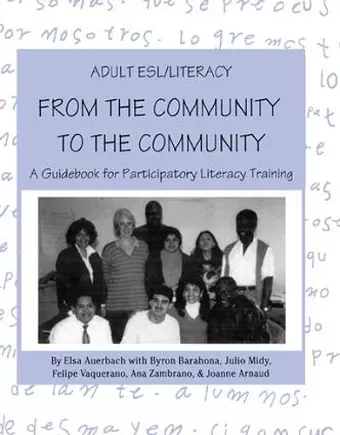Adult ESL/Literacy From the Community to the Community
A Guidebook for Participatory Literacy Training
Ana Zambrano author Elsa Auerbach author Byron Barahona author Julio Midy author Felipe Vaquerano author
Format:Hardback
Publisher:Taylor & Francis Ltd
Published:11th Jul '17
Currently unavailable, and unfortunately no date known when it will be back
This hardback is available in another edition too:
- Paperback£39.99(9780805822670)

Adult ESL/Literacy from the Community to the Community: A Guidebook for Participatory Literacy Training tells the story of a university-community collaboration to develop, implement, and evaluate a project designed to train immigrants and refugees as adult ESL and native literacy instructors in their own communities. Beyond the story of this one project, the book is also a clear and powerful explication of the underlying principles and premises of the program model it describes: community leadership development, a participatory approach to literacy instruction and instructor training, native language adult literacy instruction, and collaboration.
"The book is easy to read, and the authors add real-life examples and testimonials from mentors and interns to illustrate their points throughout. The authors effectively present their "from the community to the community" model as a viable approach for addressing ESL/literacy needs."
—The Ortesol Journal
"...the guidebook succeeds in clearly and powerfully explaining the underlying principles of the participatory approach to literacy teaching and community leadership development. The sample teacher training workshops and reflections included as an appendix were the crowning jewel of the guidebook. I urge all teachers, program administrators, students, funders, and policy makers who are interested in discovering new ways to improve the infrasturcture of our field to read this book."
—Bright Ideas
"The book is very collaborative, most of the chapters incorporating the views and voices of participants at all levels; it is deliberately written in a colloquial style and presnted in a reader friendly format. This makes it accessible to teachers, administrators, and higher-education faculty and students alike.
—The Modern Language Journal
"...a complexly layered documentation and analysis of critical praxis in the field....By skillfully and deeply weaving together theoretical foundations and daily practices, intentions and realizations, successes and struggles, [this book] captures both realistically and dramatically the rich texture of grass roots change as it is informed by the knowledge and experience of diverse participants and stakeholders....It will be useful to literacy practitioners, teacher educators, university faculty and graduate students, researchers in and out of the university, community-based educators, and others."
—Susan L. Lytle
University of Pennsylvania
"...explains the theoretical rationale [for] using students' first language as a resource for attaining literacy and ESL acquisition and also provides a step-by-step method for training teachers, usually former ESL students themselves, in this process...I especially appreciate the respect shown...for the mentors, teachers, and students in the program. The book makes clear how participatory and student-centered classes can and should operate. It shows the challenges, failures, and the many successes of the three sites described...Featuring the voices of the participants brings an immediacy and honesty to the text."
—Trudy Smoke
Hunter College, City University of New York
"...presents an implicit critique of much of the current practice of ESL and literacy instruction...[and] demonstrates innovative ways that underfunded literacy and ESL programs may expand and improve their offerings while strengthening ties to the communities of their students....ESL and literacy instructors and administrators who are interested in the participatory approach will find [this book] to be a practical handbook for program design. Its innovative approach to training interns has application for teacher training generally. Its detailed descriptions of alternative systems of program evaluation offer concrete ideas that can be adopted by ESL and literacy programs anywhere. Both administrators and teachers seeking a model for training and instruction will use it as a practical guide for their own work."
—James Tollefson
University of Washington
ISBN: 9781138401235
Dimensions: unknown
Weight: 600g
240 pages